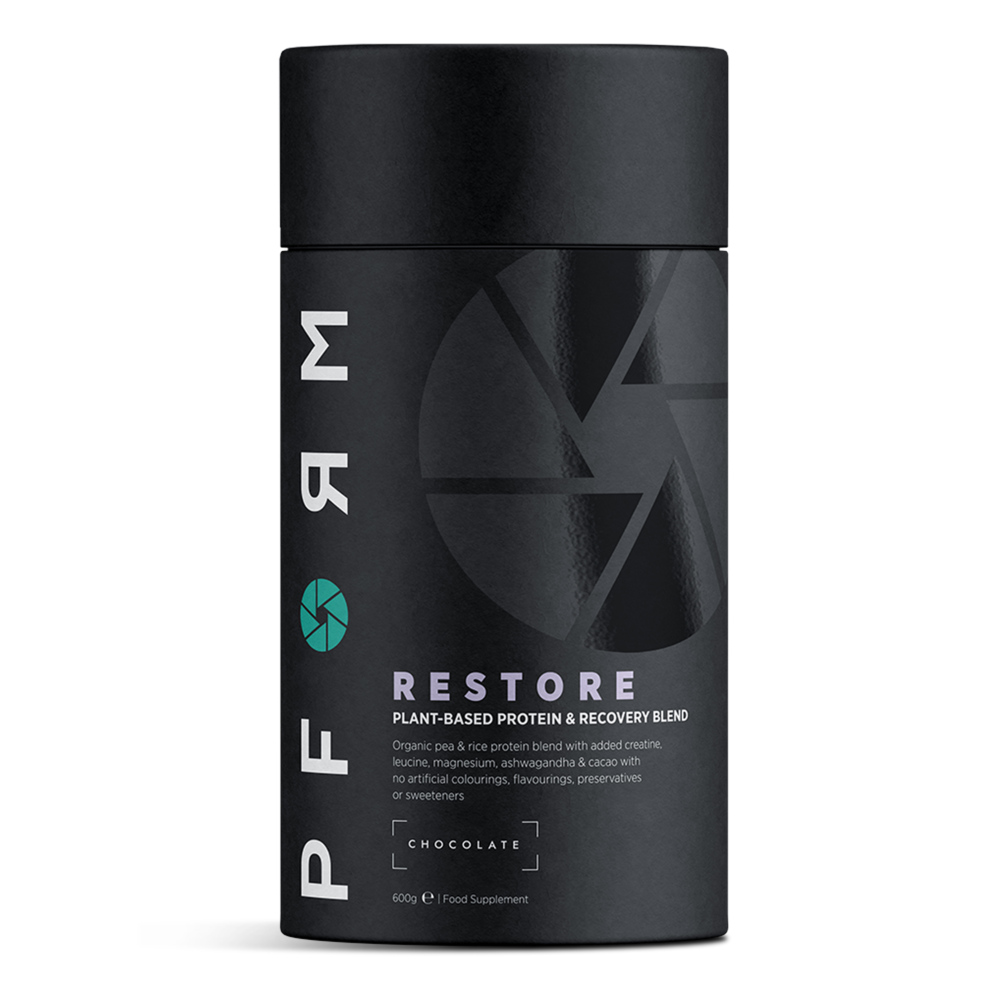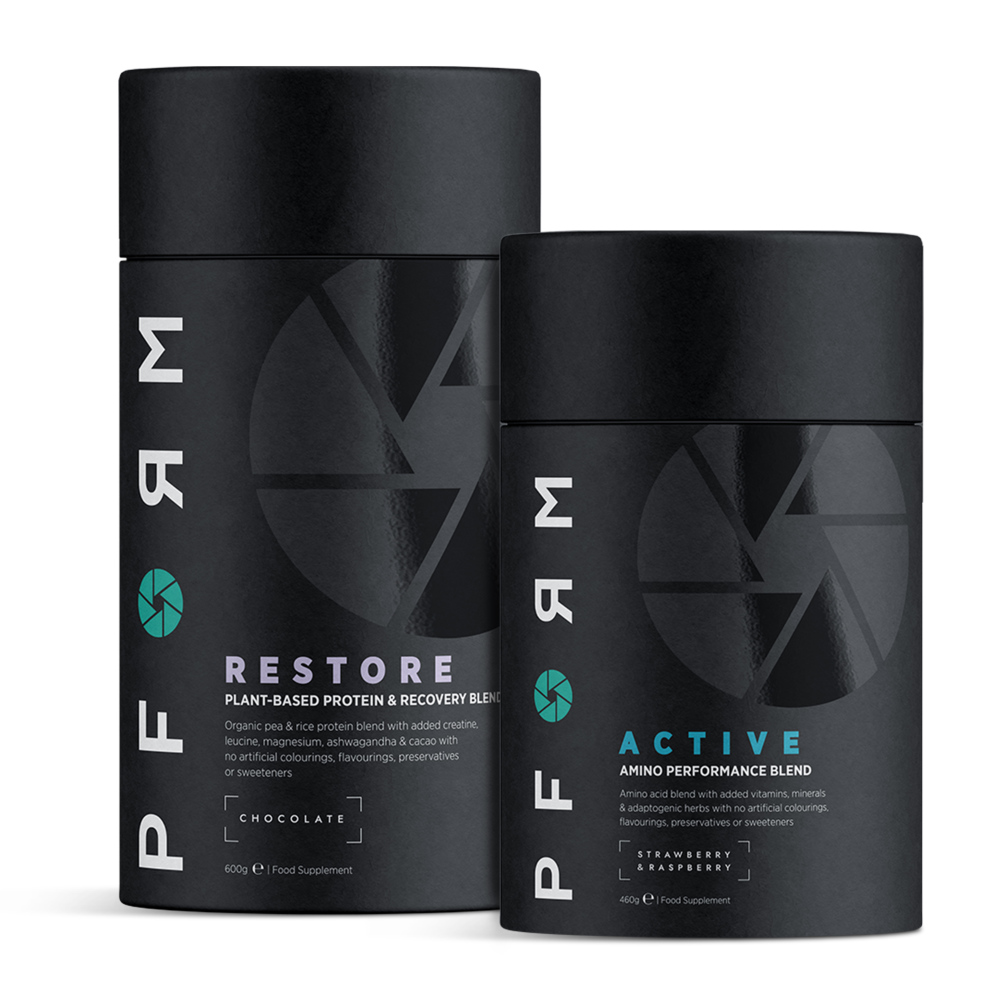
The health and athletic benefits of raw Cacao
This article introduces you to the deliciously health enhancing effects of raw cacao as well as benefits to the more athletic populations. Below we highlight why organic cacao is one of the key ingredients in the PFORM Restore formulation and not just there to add a chocolatey flavour.
Introducing Cacao
Raw cacao is the purest, most natural form of chocolate that originated in Aztec and Mayan civilisations over 3,000 years ago. It is an exceptionally nutrient dense and functional food that is the basis for the creation of chocolate!
Cacao is abundant in vitamins, minerals and polyphenols such as flavanols. Polyphenols are health promoting substances with antioxidant, anti-inflammatory and metabolic properties.
Cacao is a natural source of protein, electrolytes (magnesium and potassium) and antioxidants, all particularly important for the athlete and/or regular exerciser.
General benefits of Cacao
Heart health
Flavanols may be protective for the cardiovascular system, increasing the availability of nitric oxide, which is necessary for healthy blood vessels (1). Regular doses of cacao may facilitate an increase in blood flow (2). Cacao may also reduce blood pressure (1) and improve blood cholesterol levels (3).
Improved insulin sensitivity
Regular consumption of cacao may improve insulin sensitivity (3,4). Improved insulin sensitivity can assist in the ability for the individual to move glucose from the blood into muscle cells, where it can be used to create energy.
Improved mood
Regular consumption of cacao including products may result in improved mood (5). The high polyphenol content may improve feelings of contentment and calm (6). However, maybe this is partly due to how enjoyable it is consuming cacao!
Healthy gut
Cacao is approx. 33% fibre. Fibre can support gut health and bowel regularity (7). Fibre may be beneficial for appetite regulation and weight management too.
Brain power
Flavonoids may improve blood flow to the brain, improving response to cognitive and visual tasks (8,9).
How cacao may enhance exercise performance and recovery.
Promote recovery
Intense training sessions, high training volumes, reduced rest, and/or daily life stressors may contribute to exercise-induced oxidative damage, impairing athletic performance (10). However, supplementation of antioxidants may be detrimental and/or alter the body’s own oxidative stress response, necessary to promote positive healthy exercise-induced adaptations (11). Enter cacao – the dietary solution for antioxidants!
If reactive oxygen species (ROS, substances that signal stress levels) production and antioxidant defences become imbalanced, a dysfunctional response can occur leading to both oxidative stress and inflammation (10). High and unbalanced ROS levels may induce inflammation in the muscles, leading to accelerated fatigue, longer recovery time and reduced performance (12). The intake of cacao polyphenols may reduce exercise induced oxidative stress (10). Athletes consuming cacao show a decrease in oxidative damage and an increase in total antioxidant capacity (13).
Replenished electrolytes
Balanced electrolytes are critical for muscular contraction, fluid balance and nerve impulses (14). Therefore, following exercise sessions, electrolytes may need to be replenished for the body to function and perform at its best. Low levels of electrolytes may result in a variety of unpleasant symptoms: muscle cramping, headaches, muscle weakness, dizziness, loss of appetite and irregular heartbeat. Cacao is particularly high in the two electrolytes, magnesium and potassium. Additionally, for any athlete undertaking a high volume/intensity of exercise or following a low carb/keto diet electrolyte replenishment may be even more pertinent.
Decreased muscle damage
Cacao consumption may have favourable effects on muscle damage, with consumption of cacao decreasing markers of muscle damage (13). The improved blood flow from cacao consumption may enhance the recovery of muscle damage, supporting the recovery and healing process (2).
Energy restoring
Cacao is ridiculously nutrient rich, particularly in copper and magnesium. Both copper and magnesium play a critical role in the generation of energy (ATP). Additionally, copper is required for iron transport, necessary for the blood to be oxygenated. Cacao may therefore contribute to an optimal energy-yielding state through its mineral status (15).
Maintenance of immune function
Athletes or intense exercisers may be at increased risks of illness and infection, due to high training loads and daily life stressors. Increased antioxidant defences may be of benefit to athletes for the maintenance of immune function (Robson et al. 2003). Athletes consuming cacao show increased antioxidant capacities (13).
Introducing PFORM Restore
PFORM Restore has been formulated to support your recovery from exercise. This formula provides a 70/30 split of organic pea and rice protein, along with some additional leucine and creatine for an optimal balance of amino acids after training, but in a plant-based form. We also include Magnesium glycinate and ashwagandha to also enhance recovery along with 3grams of organic cacao for the reasons mentioned in this article, and to provide a creamy yet dark chocolate flavour.
If you are looking to restore optimal function as soon as possible after your training session, look no further than PFORM Restore for your post exercise recovery needs.
Related Products
References
- Sudarma et al. (2011). Effect of dark chocolate on nitric oxide serum levels and blood pressure.
- Petrone et al. (2013). Effects of dark chocolate on endothelial function: a meta-analysis.
- Grassi et al. (2005). Cacao reduces blood pressure and insulin resistance and improves endothelium-dependent vasodilation in hypertensives.
- Grassi et al. (2008). Blood pressure is reduced, and insulin sensitivity increased in glucose-intolerant, hypertensive subjects after 15 days of consuming high-polyphenol dark chocolate.
- Jackson et al. (2019). Is there a relationship between chocolate consumption and symptoms of depression? A cross-sectional survey of 13,626 US adults.
- Sokolov et al. (2013). Chocolate and the brain: neurobiological impact of cacao flavanols on cognition and behaviour.
- Holscher et al. (2017). Dietary fibre and prebiotics and gastrointestinal microbiota.
- Desideri et al (2012). Benefits in cognitive function, blood pressure and insulin resistance through coca flavanol consumption in elderly subjects with mild cognitive impairment.
- Mastroiacovo et al. (2015). Cocoa flavanol consumption improves cognitive function, blood pressure control and metabolic profile in elderly subjects: the cacao, cognition and aging study – a randomised controlled trial.
- Massaro et al. (2019). Effect of cacao products and its polyphenolic constituents on exercise performance and exercise-induced muscle damage and inflammation: a review of clinical trials.
- Peternlj et al. (2011). Antioxidant supplementation during exercise training: beneficial or detrimental?
- Becatti et al. (2017). Redox status alterations during the competitive season in elite soccer players: focus on peripheral leukocyte-derived ROS.
- Gonzalez-Garrido et al. (2015). An association of cacao consumption with improved physical fitness and decreased muscle damage and oxidative stress in athletes.
- Sweny et al. (2018) Muscle contraction.
- Scapagnini et al. (2014). Cacao bioactive compounds: significance and potential for the maintenance of skin health.
- Robson et al. (2003) Antioxidant supplementation enhances neutrophil oxidative burst in trained runners following prolonged exercise.
- Scalbert et al. (2005). Polyphenols: antioxidants and beyond.
- Mastaloudis et al. (2004) Endurance exercise results in DNA damage as detected by the comet assay.
- Nehlig et al. (2013). The neuroprotective effects of cacao flavanol and its influence on cognitive performance.
- Robson et al. (2003). Antioxidant supplementation enhances neutrophil oxidative burst in trained runners following prolonged exercise


